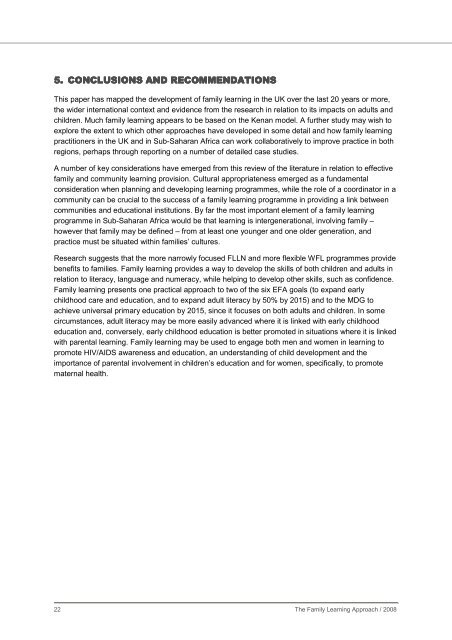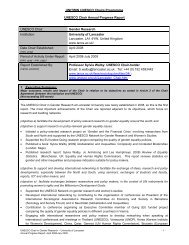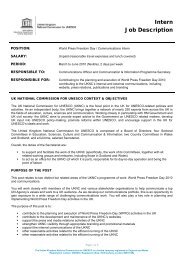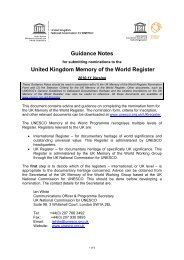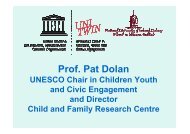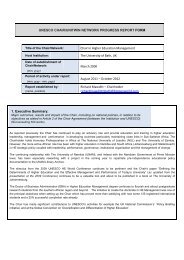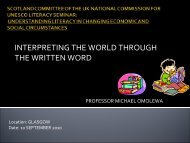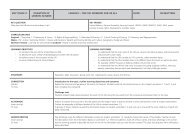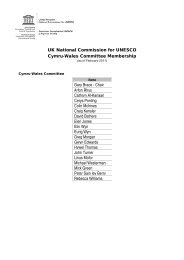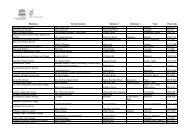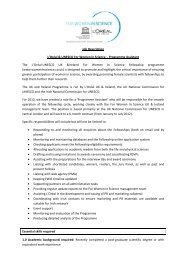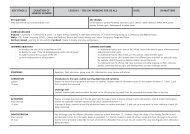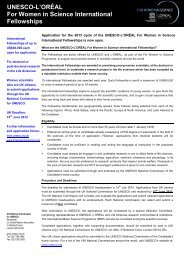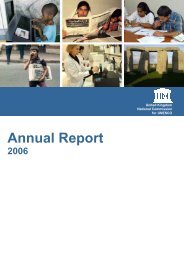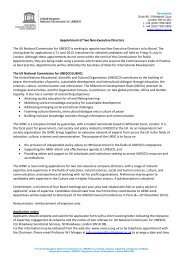5. CONCLUSIONS AND RECOMMENDATIONSThis paper has mapped the development of family learning in the <strong>UK</strong> over the last 20 years or more,the wider international context and evidence from the research in relation to its impacts on adults andchildren. Much family learning appears to be based on the Kenan model. A further study may wish toexplore the extent to which other approaches have developed in some detail and how family learningpractitioners in the <strong>UK</strong> and in Sub-Saharan Africa can work collaboratively to improve practice in bothregions, perhaps through reporting on a number of detailed case studies.A number of key considerations have emerged from this review of the literature in relation to effectivefamily and community learning provision. Cultural appropriateness emerged as a fundamentalconsideration when planning and developing learning programmes, while the role of a coordinator in acommunity can be crucial to the success of a family learning programme in providing a link betweencommunities and educational institutions. By far the most important element of a family learningprogramme in Sub-Saharan Africa would be that learning is intergenerational, involving family –however that family may be defined – from at least one younger and one older generation, andpractice must be situated within families’ cultures.Research suggests that the more narrowly focused FLLN and more flexible WFL programmes providebenefits to families. <strong>Family</strong> learning provides a way to develop the skills of both children and adults inrelation to literacy, language and numeracy, while helping to develop other skills, such as confidence.<strong>Family</strong> learning presents one practical approach to two of the six EFA goals (to expand earlychildhood care and education, and to expand adult literacy by 50% by 2015) and to the MDG toachieve universal primary education by 2015, since it focuses on both adults and children. In somecircumstances, adult literacy may be more easily advanced where it is linked with early childhoodeducation and, conversely, early childhood education is better promoted in situations where it is linkedwith parental learning. <strong>Family</strong> learning may be used to engage both men and women in learning topromote HIV/AIDS awareness and education, an understanding of child development and theimportance of parental involvement in children’s education and <strong>for</strong> women, specifically, to promotematernal health.22 <strong>The</strong> <strong>Family</strong> <strong>Learning</strong> <strong>Approach</strong> / 2008
REFERENCESAdult Literacy and Basic Skills Unit (1993) Parents and their Children: the intergenerational effect ofpoor basic skills, Adult Literacy and Basic Skills Unit, LondonAdvanced Education (date unknown) Common <strong>Family</strong> Literacy Programs/Models in Alberta, AlbertaGovernment, available at:http://www.advancededucation.gov.ab.ca/other/literacy/CommonFLPM.pdfAdvanced Education (date unknown) <strong>The</strong> Parent-Child Literacy Strategy (PCLS) Backgrounder,Alberta Government, available at:http://www.advancededucation.gov.ab.ca/other/literacy/PCLSBackgrounder.pdfAdvanced Education (2005a) <strong>Family</strong> Literacy Programs, Alberta Government, available at:http://advancededucation.gov.ab.ca/other/literacy/famlit.aspAdvanced Education (2005b) Parent-Child Literacy Strategy Progress Report, Community ProgramsBranch, April 2005, available at:http://www.advancededucation.gov.ab.ca/other/literacy/PCLSProgressReport.pdfArcher, D (2005) ‘Adapting “Reflect” to regenerate ESOL in the <strong>UK</strong>’, in Barton, D & Papen, U (2005)Linking literacy and numeracy programmes in developing countries in the <strong>UK</strong>, NRDC, LondonAuckland UniServices Ltd (2002) Pathways over the Transition to Schools: studies in family literacypractices and effective classroom contexts <strong>for</strong> Maori and Pacific children, report to the Ministry ofEducation, Ministry of Education, New ZealandAuerbach, E R (1995) ‘Which way <strong>for</strong> family literacy: intervention or empowerment?’ in Morrow, L M(1995) <strong>Family</strong> Literacy: connections in schools and communities, International Reading AssociationInc.Barton, D & Papen, U (2005) Linking literacy and numeracy programmes in developing countries inthe <strong>UK</strong>, NRDC, LondonBastiani, J (1999) Share – an evaluation of the first two years (September 1996–July 1998), CEDC,CoventryBenseman, J (2002) <strong>Family</strong> Literacy in Manukau City: First Formative and Process Evaluation Report.For City of Manukau Educational Trust (COMET) – funded by the Ministry of Education, available at:http://www.nzliteracyportal.org.nz/download/20031119091135First%20evaluation%20report%20<strong>for</strong>%20FL%20in%20Manukau%20City.docBrassett-Grundy, A (2002) Parental Perspectives of <strong>Family</strong> <strong>Learning</strong> (Research report no 2), Centre<strong>for</strong> Research on the Wider Benefits of <strong>Learning</strong>, LondonBrooks, G, Gorman, T, Harman, J, Hutchison, D & Wilkin, A (1996) <strong>Family</strong> Literacy Works: <strong>The</strong> NFEREvaluation of the Basic Skills Agency’s Demonstration Programmes, Basic Skills Agency, LondonBrooks, G, Gorman, T, Harman, J, Hutchison, D, Kinder, K, Moor, H & Wilkin, A (1997) <strong>Family</strong> LiteracyLasts: <strong>The</strong> NFER follow-up study of the Basic Skills Agency’s Demonstration Programmes, BasicSkills Agency, LondonBynner, J & Steedman, J (1995) Difficulties with Basic Skills, Basic Skills Agency, LondonCairney, T H (1992) ‘Breaking down the barriers: parents as community tutors in literacy’, paperpresented to 1992 Joint Conference of AARE & NZARE Educational Research: Discipline andDiversity, 22–26 November 1992, available at:http://www.aare.edu.au/92pap/cairt92064.txt<strong>The</strong> <strong>Family</strong> <strong>Learning</strong> <strong>Approach</strong> / 2008 23


